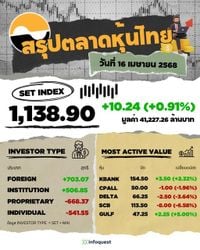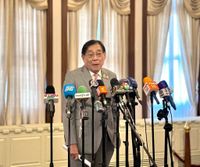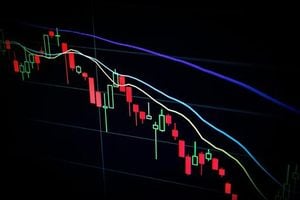The Thai stock market experienced a positive surge on April 16, 2025, with the SET index closing at 1,138.90 points, an increase of 10.24 points or 0.91%. The trading value for the day reached 41,227.26 million baht. Analysts noted that this rise was partly due to the recent Songkran holiday, which allowed the market to catch up with international trends, particularly as foreign markets saw gains.
According to Kijphop Phairatphisalakit, an analyst and strategist at Yuanta Securities (Thailand), the Thai stock market's upward movement aligns with the overall global market trends observed during the long holiday from April 14 to 15. This was influenced by the United States' decision to temporarily exempt tariffs on certain technology products, including smartphones and semiconductors. As a result, the Thai market reacted positively, despite regional markets facing profit-taking sell-offs.
Today’s trading session saw the SET index fluctuate between a high of 1,142.35 points and a low of 1,120.72 points. A total of 420 stocks increased in value, while 108 decreased and 133 remained unchanged. The rise in the index was supported by buying interest in several sectors, particularly in energy and petrochemical stocks, which had previously experienced significant price drops.
In addition to the positive market sentiment, there is speculation that the Bank of Thailand's Monetary Policy Committee (MPC) may consider lowering interest rates in its upcoming meeting at the end of April. Analysts point out that while the stock market shows signs of recovery, there is still a cautious outlook among investors, particularly due to ongoing uncertainties surrounding the U.S. trade policies.
Among the stocks with the highest trading volumes today were KBANK, which saw a trading value of 3,844.56 million baht, closing at 154.50 baht after an increase of 3.50 baht. CPALL followed with 2,634.97 million baht, closing at 50.00 baht, down by 1.00 baht. DELTA had a trading value of 2,414.46 million baht, closing at 66.25 baht, down 2.50 baht. SCB recorded a trading value of 2,210.18 million baht, closing at 113.50 baht, down by 8.00 baht, while GULF had a trading value of 1,870.52 million baht, closing at 47.25 baht, up by 2.25 baht.
In a related economic discussion, Deputy Prime Minister and Finance Minister Pichai Chunhawachira met with representatives from the Bank of Thailand to address the implications of recent U.S. tariff increases on Thai products. The U.S. has proposed a 36% tariff on certain imports from Thailand, creating significant uncertainty for Thai exporters.
Pichai emphasized the need for clear strategies to mitigate the impacts of these tariffs, which could affect various sectors, including both large and small businesses. During the meeting, which lasted for about an hour, Pichai expressed that there is a consensus on the need for close cooperation among government agencies to address these challenges effectively.
He noted, "Today, there is still no one who can confidently predict how this situation will resolve itself. The issues at hand do not solely affect Thailand and the U.S. but also have implications for other countries. The changing rules can significantly impact financial markets, including stock and bond markets, making predictions challenging."
Pichai also pointed out that the export sector is currently facing difficulties, with potential liquidity issues arising from the need to finance operations amidst declining sales and maturing debts. He indicated that the government must be proactive in identifying the root causes of liquidity challenges to implement effective measures.
In light of the discussions with the International Monetary Fund (IMF) and the World Bank, Pichai revealed that the IMF has raised Thailand's economic growth forecast to 3.6%. However, he acknowledged that there are numerous challenges ahead. The IMF's representatives expressed concerns about Thailand's competitiveness in the global market, particularly in light of recent trade tensions.
Pichai stated, "We must continue to improve our ease of doing business and address the competitiveness of our exports. The initial discussions highlighted the need for Thailand to accumulate value and tackle challenges head-on." He also mentioned that the Committee on Financial and Monetary Affairs would convene soon to discuss these pressing issues further.
As Thailand navigates these complex economic waters, the government is urged to remain vigilant and responsive to both domestic and international market changes. The interplay between U.S. trade policies and Thailand's economic framework will be crucial in determining how the country can sustain its growth trajectory amidst these uncertainties.
In conclusion, while the Thai stock market showed resilience today, buoyed by external factors and potential domestic policy shifts, the ongoing trade tensions and economic challenges necessitate a careful and strategic approach from policymakers to ensure stability and growth in the future.





